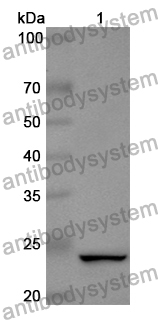Catalog No.
PHK75201
Species reactivity
Human
Host species
Rabbit
Isotype
IgG
Clonality
Polyclonal
Immunogen
E. coli - derived recombinant Human ULBP1 (Thr30-Asp206).
Tested applications
ELISA: 1:4000-1:8000, IHC: 1:50-1:100, WB: 1:1000-1:4000
Target
Retinoic acid early transcript 1I, UL16-binding protein 1, ALCAN-beta, N2DL-1, NKG2DL1, RAET1I, N2DL1, NKG2D ligand 1, ULBP1
Purification
Purified by antigen affinity column.
Accession
Q9BZM6
Applications
ELISA, IHC, WB
Form
Liquid
Storage buffer
0.01M PBS, pH 7.4, 50% Glycerol, 0.05% Proclin 300.
Stability and Storage
Use a manual defrost freezer and avoid repeated freeze thaw cycles. Store at 2 to 8°C for frequent use. Store at -20 to -80°C for twelve months from the date of receipt.
Chordoma cancer stem cell subpopulation characterization may guide targeted immunotherapy approaches to reduce disease recurrence., PMID:38741774
Dynamics of Soluble Forms of the Immune Checkpoint Components PD-1/PD-L1/B7-H3, CD314/ULBP1, and HLA-G in Peripheral Blood of Melanoma Patients Receiving Blockers of Programmed Cell Death Protein PD-1., PMID:37773572
Circulating exosomal immuno-oncological checkpoints and cytokines are potential biomarkers to monitor tumor response to anti-PD-1/PD-L1 therapy in non-small cell lung cancer patients., PMID:36741391
The metabolism of cells regulates their sensitivity to NK cells depending on p53 status., PMID:35217717
The NKG2D ligand ULBP4 is not expressed by human monocytes., PMID:33556116
NK Cell Interaction With Platelets and Myeloid Cells in the Tumor Milieu., PMID:33424862
Production of a novel bispecific protein ULBP1×CD19-scFv targeting the NKG2D receptor and CD19 to promote the activation of NK cells., PMID:33122138
Human Metapneumovirus Escapes NK Cell Recognition through the Downregulation of Stress-Induced Ligands for NKG2D., PMID:32698530
UL16-Binding Protein 1 Induced HTR-8/SVneo Autophagy via NF-κB Suppression Mediated by TNF-α Secreted through uNK Cells., PMID:32626772
MICAgen Mice Recapitulate the Highly Restricted but Activation-Inducible Expression of the Paradigmatic Human NKG2D Ligand MICA., PMID:32582150
MG132 selectively upregulates MICB through the DNA damage response pathway in A549 cells., PMID:30483783
Xenogeneic transplantation and tolerance in the era of CRISPR-Cas9., PMID:30480643
Combined inhibition of JAK1,2/Stat3‑PD‑L1 signaling pathway suppresses the immune escape of castration‑resistant prostate cancer to NK cells in hypoxia., PMID:29693186
Cutting an NKG2D Ligand Short: Cellular Processing of the Peculiar Human NKG2D Ligand ULBP4., PMID:29651291
Human U87 glioblastoma cells with stemness features display enhanced sensitivity to natural killer cell cytotoxicity through altered expression of NKG2D ligand., PMID:28203118
Immunohistochemical validation and expression profiling of NKG2D ligands in a wide spectrum of human epithelial neoplasms., PMID:25473094
Recognition of adult and pediatric acute lymphoblastic leukemia blasts by natural killer cells., PMID:24658822
Enhanced interaction between natural killer cells and lung cancer cells: involvement in gefitinib-mediated immunoregulation., PMID:23937717
Valproic acid upregulates NKG2D ligand expression and enhances susceptibility of human renal carcinoma cells to NK cell-mediated cytotoxicity., PMID:23671445
Valproic acid upregulates NKG2D ligand expression through an ERK-dependent mechanism and potentially enhances NK cell-mediated lysis of myeloma., PMID:23308050
Aberrantly decreased levels of NKG2D expression in children with kawasaki disease., PMID:23298273
Resveratrol sensitized leukemia stem cell-like KG-1a cells to cytokine-induced killer cells-mediated cytolysis through NKG2D ligands and TRAIL receptors., PMID:22406996
NKG2D ligand tumor expression and association with clinical outcome in early breast cancer patients: an observational study., PMID:22257486
Interleukin-10 promotes NK cell killing of autologous macrophages by stimulating expression of NKG2D ligands., PMID:20883317
Human IgG1 antibodies antagonizing activating receptor NKG2D on natural killer cells., PMID:20061825
NKG2D-mediated immunity underlying paroxysmal nocturnal haemoglobinuria and related bone marrow failure syndromes., PMID:19594748
Expression of the ULBP ligands for NKG2D by B-NHL cells plays an important role in determining their susceptibility to rituximab-induced ADCC., PMID:19358282
Glycosylphosphatidylinositol-anchored protein deficiency confers resistance to apoptosis in PNH., PMID:19013003
Induction of NKG2D ligands and subsequent enhancement of NK cell-mediated lysis of cancer cells by arsenic trioxide., PMID:18463537
Potentiation of NK cell-mediated cytotoxicity in human lung adenocarcinoma: role of NKG2D-dependent pathway., PMID:18441340
[Expression of NKG2D ligands on dendritic cells at different development stages and its effect on cytotoxicity of NK cells]., PMID:18394338
Induction of NKG2D ligands on human dendritic cells by TLR ligand stimulation and RNA virus infection., PMID:17878262
Lysis of a broad range of epithelial tumour cells by human gamma delta T cells: involvement of NKG2D ligands and T-cell receptor- versus NKG2D-dependent recognition., PMID:17635809
[Expression of NKG2D ligands in multidrug-resistant nasopharyngeal carcinoma cell line CNE2/DDP and their effects on cytotoxicity of natural killer cells]., PMID:17584663
DNAX accessory molecule-1 mediated recognition of freshly isolated ovarian carcinoma by resting natural killer cells., PMID:17283169
The switch from latent to productive infection in epstein-barr virus-infected B cells is associated with sensitization to NK cell killing., PMID:17079298
Immunoselection by natural killer cells of PIGA mutant cells missing stress-inducible ULBP., PMID:16195329
Natural killer cell-mediated lysis of hepatoma cells via specific induction of NKG2D ligands by the histone deacetylase inhibitor sodium valproate., PMID:16024634
Consequences of human cytomegalovirus mimicry., PMID:15172446
Comparative analysis of human NK cell activation induced by NKG2D and natural cytotoxicity receptors., PMID:15048706
Major histocompatibility complex class I-related chain A and UL16-binding protein expression on tumor cell lines of different histotypes: analysis of tumor susceptibility to NKG2D-dependent natural killer cell cytotoxicity., PMID:12414645
UL16-binding proteins, novel MHC class I-related proteins, bind to NKG2D and activate multiple signaling pathways in primary NK cells., PMID:11777960
ULBP1, 2, 3: novel MHC class I-related molecules that bind to human cytomegalovirus glycoprotein UL16, activate NK cells., PMID:11465099

